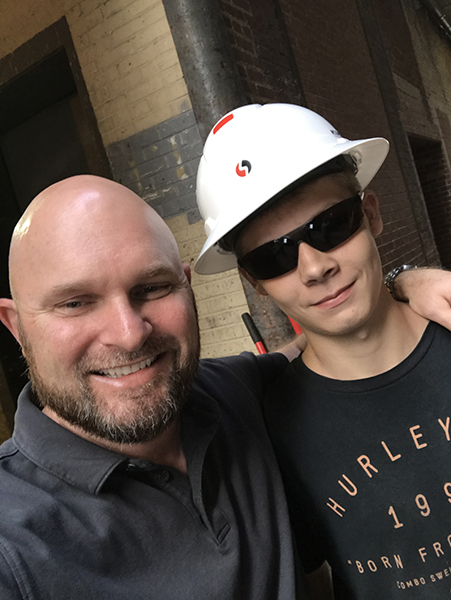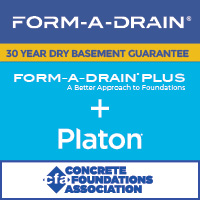Stephens & Smith Construction Company Revives Student-Learner Program
FEATURE ARTICLE:
Stephens & Smith Construction Company Revives Student-Learner Program
By Jereme Montgomery, Business Development
Many of you reading this article will testify that the skill gap is real. There is a shortage of skilled craftsmen in the construction industry, and it has continued (and will continue) to effect quantity and quality of structures built in America. I’d like to take it one step further: More important than the skill gap, is a lack of awareness regarding construction careers available. It is time the construction industry, and specifically the individual trades within it, take action. Let’s stop blaming the education system for lack of emphasis on trades. Let’s stop blaming parents for “brain-washing” youth into believing that a four-year college is the only path to success. If we truly want to see change in career awareness for construction trades, we have to become advocates at a local level. That is precisely what we are determined to do here at Stephens & Smith.
In May of 2018, leaders in the construction industry around Lincoln, Nebraska took it upon themselves to coordinate a “hands-on” construction career day. The Home Builders Association of Lincoln, in conjunction with Build Our Nebraska, worked with public and private schools to create an event dedicated to creating construction career awareness. Over twenty local construction companies and equipment suppliers sponsored multiple exhibits where youth could experience many of the activities or “jobs” associated with working in construction. These were jobs like driving skid loaders, operating backhoes, using hand tools, finishing concrete, and many other hands-on activities. It was the first construction career day organized in Lincoln for over a decade. During the event, I had the pleasure of meeting a 17-year-old student who was cleaning up from stamping some concrete. As I began a conversation, he said, “I want to do that. I want to be a concrete finisher.” Without hesitating I replied: “Say no more.” One month later, our company hired its first 17-year-old employee since the 1980s, Mr. Diamond Potter.
The U.S. Department of Labor’s Employment Standards Administration defines seventeen hazardous occupations in non-agricultural settings. According to the Fair Labor Standards Act, or the Wage-Hour Law, the safety and well-being of a young person is to be protected by employers. They may not allow minors to perform work that has been determined by the secretary of labor to be hazardous. Hazardous Occupation Orders generally prohibit youth under the age of 18 to engage in occupations and activities such as:
- Manufacturing and storing explosives
- Motor-vehicle driving and being an outside helper
- Coal mining
- Logging and saw milling
- Using power-driven woodworking machines (including saws)
- Being exposed to radioactive substances
- Operating power-driven hosting devices, including forklifts, cranes, and non-automatic elevators
- Using power-drive metal forming, punching, and shearing machines
- Mining other than coal mining
- Slaughtering or meat packing, processing or rendering, including the use of power-driven meat slicers*
- Operating power-driven bakery machines
- Using power-driven paper product machines, including paper balers*
- Manufacturing brick, tile, and similar products
- Using circular saws, band saws, and guillotine shears*
- Wreaking, demolition and ship-breaking
- Roofing operations*
- Excavating, including work in a trench as a plumber*
*Exemptions: Student-learners aged 16 or 17 enrolled in career education programs that meet the minimum requirements may be employed on a limited basis in the five hazardous occupations listed with an asterisk (*). Under these requirements, the agreement must provide that:
- The student-learner is enrolled in a course of study and training in a cooperative vocational training program.
- Student-learners employed under a written agreement must provide:
- That the work of the student-learner in the occupations declared particularly hazardous shall be incidental to his/her training;
- That such work shall be intermittent and for short periods of time, and under the direct and close supervision of a qualified and experienced person;
- That safety instructions shall be given by the school and correlated by the employer with on-the-job training; and
- That a schedule of organized and progressive work processes to be performed on the job shall have been prepared.
 Sounds like a lot, and it should. Our industry can be dangerous without proper instruction or guidance. The safety of these student-learners is priority number one. Prior to the hiring of our student learner, Stephens & Smith Construction Company worked closely with the Nebraska Department of Education and the Nebraska Department of Labor to ensure we had all our “ducks in a row.” Since I volunteered to become Mr. Potter’s concrete mentor, I have had the pleasure of reviewing his first essay of the summer required for class. I quickly realized that this student-learner’s experience was not only about teaching career awareness, but was also about teaching life lessons. To prove this, his essay required him to answer three questions:
Sounds like a lot, and it should. Our industry can be dangerous without proper instruction or guidance. The safety of these student-learners is priority number one. Prior to the hiring of our student learner, Stephens & Smith Construction Company worked closely with the Nebraska Department of Education and the Nebraska Department of Labor to ensure we had all our “ducks in a row.” Since I volunteered to become Mr. Potter’s concrete mentor, I have had the pleasure of reviewing his first essay of the summer required for class. I quickly realized that this student-learner’s experience was not only about teaching career awareness, but was also about teaching life lessons. To prove this, his essay required him to answer three questions:
1. What can you learn from a job that you cannot learn in a traditional classroom?
Since my summer employment, I have learned many things about my job that I wouldn’t have learned in a traditional classroom. First, you can’t pour or finish concrete in a classroom. When you’re in a classroom you don’t get to interact with other concrete tradesman. Also, I have learned how equipment helps make our jobs easier. Most importantly I have learned by doing hands-on construction activities.
2. What do you like most about your job?
What I like most about my job is simply being outside. I enjoy NOT having to sit behind a desk and I enjoy the view when working outside. I also enjoy building things. It is nice to look back at what we built for the day and say, “I helped build that.” A couple other things I enjoy most about my job is the people [sic]. They are fun to work with, even when things get tough. Lastly, I definitely enjoy the money the most. This will help me fix my car and save up for an apartment when I graduate.
3. What do you like least about your job?
Early mornings are what I like the least. I have learned that in order to “beat the heat,” we have to start before the sun comes up. Then we have work in the hot sun for the rest of the day. It is hard work. I enjoy what I do and the people I work with. I’ve learned that you have to stay busy in order to earn respect from my co-workers. Earning respect is important with any job.
– Diamond Potter, June 29, 2018
This has been a true learning experience for us at Stephens & Smith. We realize that this opportunity is unique, and we hope other construction companies take advantage of this program next summer. Mr. Potter is the first student learner in Nebraska since the late 1980s who has taken the proper legal steps to work in Nebraska’s construction industry. This is great news for our industry and a great chance to show off our trades. It is high time more construction companies take advantage of student-learner programs. Local advocacy is, and will continue to be, the most effective recruitment tool we have in our toolbox. Don’t let it get rusty. Our path is not a difficult one to follow, and if your company is a CFA member, I would love to help you with a blueprint for understanding your state requirements and setting a path toward engaging student learners for your future operations.
Jereme Montgomery is the former Director of the Nebraska Concrete & Aggregates Association. He now serves as a business development member for CFA, Stephens & Smith Construction Company Inc. is located in Omaha and Lincoln, Neb. | @NEconcrete | www.stephensandsmith.com | JMontgomery@stephensandsmith.com
Resources:
- USDOL page with useful information: https://www.dol.gov/general/topic/youthlabor/hazardousjobs.
- Regulations (Subpart E for hazardous occupations): https://www.ecfr.gov/cgi-bin/text-idx?c=ecfr&sid=48d6ee3b99d3b3a97b1bf189e1757786&rgn=div5&view=text&node=29:3.1.1.1.31&idno=29#sp29.3.570.e.
- Safety resource for Young Worker Safety and Health: https://www.cdc.gov/niosh/topics/youth/.
- USDOL website designed for youth https://www.youthrules.gov/.









